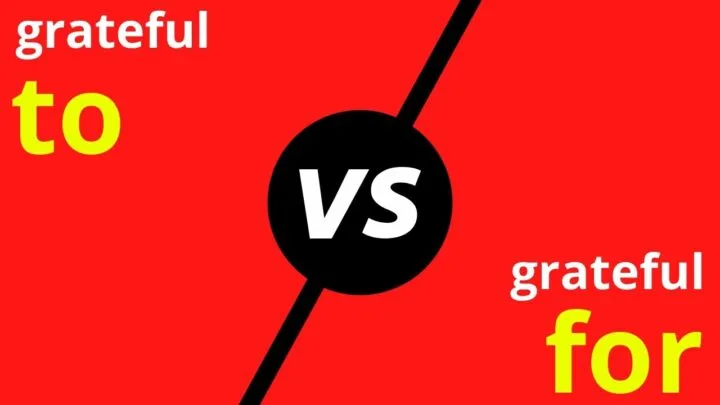When was the last time you told somebody you were grateful to them about something?
It’s important to express gratitude when someone has done something nice for you. Sometimes, it’s enough to just say “thank you.”
However, sometimes you might want to go a step further and express to someone how genuinely grateful you are in regards to something they have done or something that you have.
But are you “grateful for” or “grateful to? Keep reading to make sure you get it right!
What is the difference between “grateful for” and “grateful to”?
You would use “grateful for” when you are talking the thing that caused your gratitude and “grateful to” when you are talking about the person or entity that provided you with the thing.
Understanding the difference between “grateful for” and “grateful to”?
One way to understand when to use “grateful for” and when to use “grateful to” is by looking at the prepositions “for” and “to.”
One of the many definitions of “for” is “because of.” You can see it in the sentences below:
She can’t see the forest for the trees.
When you see “grateful for” in a sentence, “for” means “because of”:
They were grateful for the good weather.
As for the word “to,” it is what is called a “function word” in linguistics.
This means that it does not have a meaning itself so much as it functions in a certain way to show the relationship between other words in the sentence.
When paired with “grateful,” it shows what the object of the adjective “grateful” is, toward whom that feeling is applied:
She was grateful to the company.
Yet another way to remember the difference is to turn these phrases around into questions:
To whom are you grateful? What are you grateful for?
Maybe you want to tell your friend, “Thank you for the heads up“:
I didn’t know they were planning to fire me until you said something. I’m so grateful to you!
Or maybe you’re just glad about the information:
I’m grateful for the heads-up.
Note that “grateful for” for is generally about things and “grateful to” is generally about people.
This is usually but not always true, but we’ll dig into the subtleties of that below.
Examples of “grateful for” in a sentence
Yet another way to think about “grateful for” is that a sentence that uses these words is mainly about your gratitude about the thing and not whoever or whatever provided you with the thing:
He was grateful for the opportunity to take a break.
In fact, in some cases, there might not even be a provider of the thing:
They were grateful for the excellent weather during their vacation.
As mentioned above, “grateful for” is usually used for things, but it can be used to talk about people as well.
However, when it is used in this way, even though you are feeling gratitude about people, it is directed less at them and more at simply the fortuitous circumstances that allowed you to have these wonderful people in your life:
Shirley was grateful for her terrific coworkers.
I am grateful for my parents.
If you want that emotion of gratitude to be more directed at the people themselves, use “grateful to.”
Examples of “grateful to” in a sentence
When you say “grateful to,” you are directing attention to the people who provided you with the object of your gratitude.
Here are a few ways you might used that in a sentence:
Examples of “grateful to” with “for” in the same sentence
Some sentences will use “grateful to” along with “for” to indicate both who is responsible for the thing and what the thing is.
For example, maybe you are grateful to your friend for coming to pick you up in a timely manner:
I’m so grateful to Jeanne for getting there before those annoying people started talking to me!
Looking at a few examples of how the two separate types of sentences can be combined into one can help you better understand the difference in the two:
I am grateful to my parents. I am grateful for the money they loaned me.
I am grateful to my parents for the money they loaned me.
She is grateful to the Rockefeller Foundation. She is grateful for the grant they gave her organization.
She is grateful to the Rockefeller Foundation for the grant they gave her organization.
Hamid was grateful to Marjorie. He was grateful for her advice.
Hamid was grateful to Marjorie for her advice.

Hey fellow Linguaholics! It’s me, Marcel. I am the proud owner of linguaholic.com. Languages have always been my passion and I have studied Linguistics, Computational Linguistics and Sinology at the University of Zurich. It is my utmost pleasure to share with all of you guys what I know about languages and linguistics in general.

